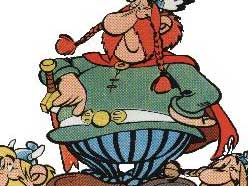| Title | Vitalstatistix |
| Category | Important Characters |
| Mangaka | nothing entered |
| Read Online | nothing entered |
Chief Vitalstatistix is the leader of the Gaulish village. He is a middle-aged, overweight man with red hair, pigtails and a huge moustache. He is generally reasonable, well-informed, fearless, (comparatively) even-tempered and unambitious – the last much to the chagrin of his wife Impedimenta. His major failings are his love of good food and drink (it is unlikely to be a coincidence that his wife is the best cook in the village) – which has led to health problems – and his pride. As a Gaulish chief he prefers to travel on a shield, carried by two shield bearers (they say pride comes before a fall… and he finds creative new ways to fall off the shield in almost every book). The names of the shield bearers are never mentioned.
Vitalstatistix fought at the battle of Alesia where Caesar (almost) completed his conquest of Gaul, before becoming chief of the village. In Asterix and the Chieftain’s Shield it was revealed that the shield he is carried on originally belonged to the legendary Gaulish warrior chief Vercingetorix.[2] His father was the village chief before him. He has a brother, Doublehelix, in Lutetia who has a young daughter and a son, Justforkix.
The introduction to each story states that Vitalstatistix has only one fear “that the sky may fall on his head tomorrow”; however, he rarely alludes to this in an actual story, and then only as a rallying cry: “We have nothing to fear but …”. This characteristic is based on a real historical account where Gallic chieftains were asked by Alexander the Great what they were most afraid of in all the world, and replied that their worst fear was that the sky mught fall on their heads.[3]
Although the chief of the village, his role in most plots is usually minor, commonly featuring him granting Asterix and Obelix permission to go on their latest missions, although he has shown a greater involvement in stories such as Asterix in Belgium, where he travelled to Belgium to defend his honour when Caesar apparently proclaimed that the Belgians were the bravest of all the Gaulish peoples, or Asterix and Caesar’s Gift, where he ran against a new arrival in the village for the position of chief.
- French: Abraracourcix (“à bras raccourcis” – “with arms up ready to fight”) – this is the same in Italian, Portuguese, Spanish and (original) Dutch (although the “o” is usually dropped)
- In English, his name is a pun on Vital statistics – the government birth and death records of a region and also an expression for a person’s measurements (a comment on his size). In the American translation, he was Macroeconomix from macroeconomics. NOTE: In the English version of the Asterix the Gaul film, he also appears to have been called Tonnabrix (spelling isn’t confirmed), and in the American dub of the Asterix and the Big Fight film he is called Bombastix.
- In Catalan, he is Copdegarròtix (“cop de garrot” – “club hit”)
- In German, Greek, Latin and Scandinavian, he is Majestix from majestic; similarly in new Dutch translations he is Heroix from heroic.
- In Esperanto he is Moŝtiks (“via moŝto” – your highness)
- In Finnish he is Aladobix, referring to ‘aladobi’, a Finnish jelly-like dish containing meat (from the French à la daube)
- In Hungarian, he is Hasarengazfix, which means ‘His belly surely shakes’
- In Polish, he is Asparanoiks, referring to ‘paranoia’, the fear of the sky falling on his head.
- In Turkish, Toptoriks, alluding to his roundness.
- In Brazilian Portuguese, his name is usually shortened to Abracurcix.
- In Hindi translation, his name is mentioned as मुखिया मोटुमालिक्स (Mukhiya Motumallix), which literally means, ‘The Fat Chief’
- In Bengali , the chief has a name phonetically similar to some extent to his English one: Bishalakritix, taken from the root bishalakriti, which aptly means “of huge proportions”.
- In Hebrew, his name is לוחמאמיקס (lokhem-amix), meaning ‘brave warrior’.
- In Serbian, He is Дрматорикс (Drmatoriks/Drmatorix), from “drmator”, a slang term for Communist era movers and shakers (“drmati” means “to shake”)
- In Welsh, he is Einharweinix, from ein harweinydd (our leader)
- In Greek film variations he was called Χοντρομπαλίξ, from χοντρομπαλάς (dubbing a man “fat ball”), but is currently referred to as Μαζεστίξ (from French majestueux, i.e. majestic).He was also formerly called Μοναρχίξ (Monarchix) from the word μονάρχης (monarch) but the name changed in the later book translations after 1991.
- In Sinhalese – “Loku Pappa” which means Big or Head/Leader

